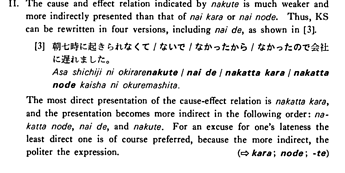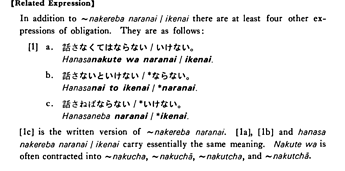Hello guys, I am using Bunpro for a while now, and learn Japanese for a total of aproximately 3 years now. And there is something about the language that drives me crazy, and that is なくてはいけない and similar grammar points like なくてはならない. For me personally, learning grammar is about being able to create correct sentences over everything else. After I struggled through these 2 grammar points for weeks now, I was so frustrated today that I asked ChatGPT why the grammar of these points sound so unnatural for me. As, I would just say something like 薬を飲まないではいけません or いけない、ならない and so on. And ChatGPT just said that my sentences are perfectly fine while Bunpro wouldn’t even recognize my version as being alternative correct answers, which is incredible frustrating. And while I understand that the point of the grammar being taught is to learn it and to understand it if I hear it in the wild, I am still incredibly frustrated by this, as I am able to understand it, but my brain refuses to created sentence structures that contain the くて in this specific context and I keep having these grammar points in my reviews wrong. So I wanted to ask you all what you think about this and maybe how to deal with my problem or why you think I’m all wrong about this or something 
You’re not alone.
They probably sound unnatural for you because you’re used to hearing them in the forms of なくちゃ or なきゃwhich are both very common in real life and heavily used in media as well.
I feel that way more than I like to admit.
There is a possibility that it’s also that. But I also think there is the additional problem that my native language is German, and we usually don’t use double negation at all. The reason for that is that it is just not needed in German and would cause confusion for most speakers.
For example:
I have money. Ich habe Geld.
I have no money. Ich habe kein Geld.
I have not no money. Ich habe nicht kein Geld. (Which simply means I have money in German because of the double negation neutralizing itself and therefore making the negation obsolete to begin with. It also sounds vastly unnatural and could confuse people just because there is no sense to it being said over the first sentence, implying the speaker might want to say something else)
Sorry for the lengthy explanation but some people might hopefully find that interesting or can relate to it.
Hey @EmperorLicht !
The reason that 薬を飲まないではいけません is marked as incorrect is because ないではいけない is not grammatically correct (as a native speaker, it sounds very unnatural). For it to be grammatically correct, when conjugating using いけない to mean ‘must do (A)’, なくては or something similar must be used (ex:ないと、なければ、etc.) must be used. This is why using alternative grammar that is grammatically correct and/or natural currently prompts a hint.
As for the synonym ‘hell’, like いけない, ならない, etc., we are aware of this and we are currently in the process of rewriting some of the hints so that it makes it more clear on which grammar point we are looking for.
I like when the hints say “make it more formal” and then “make it more casual” so you have to slowly narrow down on the target by going through all the variations 
But I think that eventually the なくては just feels like part of a set phrase and you stop thinking about how convoluted the double negative is.
Well first of all thank you very much for your answer. However, and you might disagree, but even Japanese ChatGPT states: …“ちなみに、「〜ないではいけません」という言い回し、日常会話ではまれに聞くけど、書き言葉やフォーマルな場ではあまり使われないの。”… And while it says that the sentence I constructed is very rare, it also says it is correct on a linguistical level.
I think this is very confusing also because every single machine translation tool I used could read and understand what I wrote. As a source, I was told by the English ChatGPT that “A Dictionary of Basic Japanese Grammar by Seiichi Makino and Michio Tsutsui” is stating it’s interchangeable. And while I could get my hands on that book in the meantime, I unfortunately could not verify that sentiment. I could just find some grammar points in which it said that ないで and なくて are interchangeable, or one can be replaceable by the other.
Right now I try to find the Japanese sources that are also stated, but this will take me a bit longer even if I try to use my University network to get a PDF version. Fortunately, I have relatively easy access to a lot of these resources as I am a Japanology student here in Germany. But going searching for and going thought “新日本語文法解説, 大辞林 and 日本語文型辞典” is probably something I should not do at 5 in the morning, so I will probably postpone this for a bit.
The discussion of using AI to learn Japanese has already been played out on Bunpro, but please take AI with a grain of salt. It can be a very useful tool, but taking it as the word of law against a native Japanese speaker is not the play. Even if you find it to be technically “correct,” that doesn’t make it a natural way to say it.
You seriously trust chat gpt??? Ai is not correct with most technical language aspects.
As I haven’t seen the dialogue you had with ChatGPT I am going to have to guess at the reasoning here, but this is likely due to the fact that you can structurally construct a sentence like しないではいけない without breaking any strict rules to do with word order, etc. This doesn’t mean that しないではいけない is the normal idiomatic way of saying ‘must do’ in Japanese, which is what the review is testing for. Someone may be technically understood if they say that but it would come across as a non-native error, especially in the context of the review sentences.
In some particular cases this is true, however ないで and なくて fundementally mean different things and essentially can’t be swapped without the change in meaning that is associated with that. There are many fixed patterns and phrases which use one or the other and it is not possible to swap them in those cases. Equally, なくては also has a specific use beyond just なくて but that is a bit beyond N5 grammar.
This topic is an interesting one, for sure. Ultimately the alternative answers here shouldn’t accept ないではいけない (or variants), though. Having said that, if you think there are any issues when reviewing then you can hit the Bug button in the bottom right and send us some specific feedback for that review sentence.
I can appreciate your frustration, but ChatGPT should not be considered when attempting to formulate definitive conclusions about ANYTHING. This is a massive issue in the field of Information Literacy as a whole, so you’re not alone. Still, you should not rely on it, especially for the intricacies around foreign language/grammar. My best advice is to thoroughly study the details of the grammar points and learn to distinguish their usage and appropriate settings.
Die doppelte Verneinung ist im Deutschen nicht unüblich  (Double negations isn’t uncommon in german) You probably just didn’t notice that the above construction is a double negation cause you’re used to it.
(Double negations isn’t uncommon in german) You probably just didn’t notice that the above construction is a double negation cause you’re used to it.
Well, I appreciate your comment, but I will take what anybody says with a grain of salt. If I trusted AI’s blindly, I wouldn’t have created this post. But trusting a person I don’t know, and I have no clue about the merits besides claiming to be native, is also something I don’t do. This doesn’t mean I want to invalid Fuga’s comment, it was indeed very helpful, but something sounding unnatural and being straight up wrong are 2 different things.
Plenty of native German and English speakers don’t know how to use their own language correctly, and most people aren’t linguists. So getting a definitive answer is not as simple as you might want to suggest.
Of course, this also means that I could be absolutely wrong here, and that’s ok. I am simply trying to play devil’s advocate as I keep having problems with this specific usage of double negation and especially the usage of くて in general, when not paired with an adjective.
Knowing if there is a basis of me being correct and backtrack how I came to that false conclusion would in the end benefit me in understanding the language on a fundamental level. Just getting told that I’m wrong, and It sounds unnatural while not knowing why exactly is very frustrating to me.
I understand and appreciate your comment. Also, this is not about if my answer should be marked as correct in the SRS. It is about my frustration of my supposedly correct grammar, what as of now seems to be not correct. Because on a fundamental level, I don’t really understand なくて vs ないで, as ない seems to be the natural way of negating something(?) and なくて is just when you want to negate くて. So instead of 可愛くて、面白いです。to negate the first one using 可愛くなくて、面白いです。
I have no clue what exactly my problem here is, but I suppose there must be a major error in my understanding of it. As even in my example It seems like くなくて seems to stem from くない + くて which might be different from なくて.
Plenty of native German and English speakers don’t know how to use their own language correctly, and most people aren’t linguists.
You don’t have to be a linguist to know whether or not something sounds natural in your native language. Any adult can do so, while ChatGPT cannot.
Thank you for the link to the grammar point, that was really helpful.
I still have to disagree with the comment afterwards. Not every person is comprehensible the same way or even perceives language the same way. What might sound aggressive to one person sounds normal to another, and so on. Same for natural sounding language.
Also, I never stated that you have to be a linguist to determine if a sentence sounds natural. There are plenty of sentence structures that could be constructed and would be considered “correct” within the linguistical rules of a given language, while sounding incredibly unnatural for the average speaker.
Don’t get me wrong, I don’t advocate for the implementation or usage of unnatural or seldom language. This is merely about me being kind of eccentric and trying to find my own way into the language and hopefully being able to construct natural sentence structures one day. And just being told that I am wrong, and I should use “this” or “that” grammar instead is not helping me with that. This is more of a “Me” problem but as I said thank you very much for the link, I think this actually helped me. Especially the example sentence using 飲んでは寝られない caught my eye. 
i think i dont really see that grammar in real speech, cus ive entered a lot of media and i havent seen it a single time often using なきゃ or と
ないで vs なくて confused me a lot as well. They felt similar but are in fact not interchangeable in most cases, especially when it comes to set expressions. I found ないで vs なくて - #2 by mrnoone to be a clear and concise explanation.


